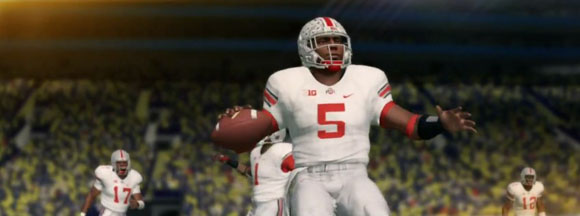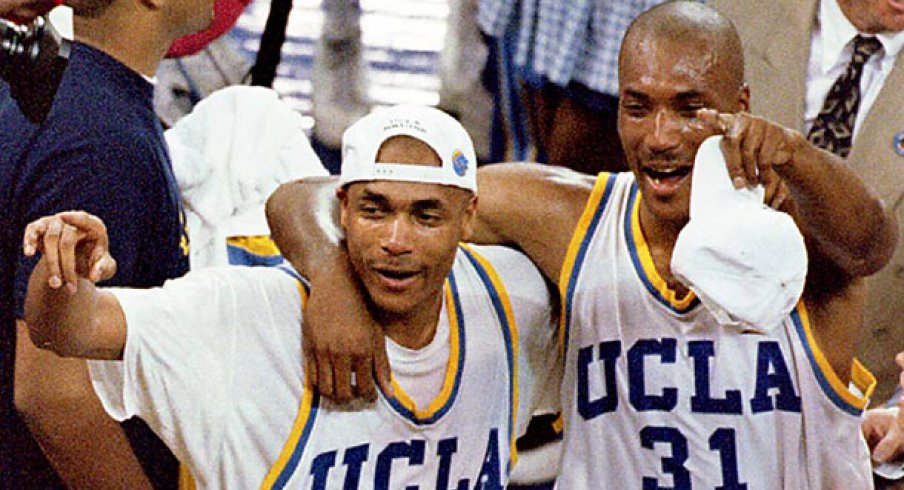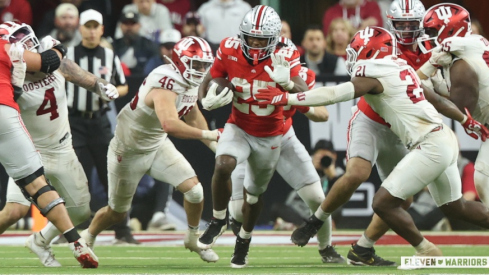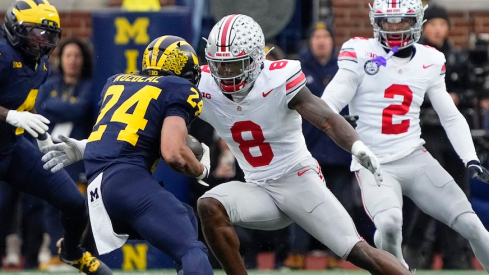Do you like money? I sure do, especially ever since The Simpsons taught me that money can be exchanged for goods and services. Once I found that out, and then realized that other people will literally just give me money for working for them, everything just kind of fell into place.
That's how the world is generally supposed to work. Unless you're an NCAA athlete, specifically an NCAA athlete that plays either football or basketball. Then your money making ability is going to be severely hindered because of a tangle of jargon that explicitly says that hindrance is to make sure that uh, something something amateurism corruption money stipend something bad evil SMU. That'd be all well and good (I mean, it wouldn't, but just stay with me here), but at the same time the organization that doesn't allow you to profit off your adorable face is selling the rights to said face to video game companies and television networks.
Put another way, let's say that you are somehow good at two things. I know it's tough, but use your imagination. So anyway, you get paid to do one of those things, and you're generally pretty happy about that. But man. That other thing. You're really good at it too. And people know you're good at it, and will pay you money for it. But wait! Your boss refuses to let you do it, or you'll be fired. But you say okay, because hell, it's a job, and this kind of thing happens all the time.
Then one day you see your boss videotaping you doing that other thing that you're pretty good at. People pay him big time money for that video, and you have to be cool with it, even if the money that your boss makes far, far outweighs the money you're getting for your job. That might make you pretty angry. Maybe even angry enough to sue.
That's essentially what O'Bannon v. NCAA is about. Ed O'Bannon, a former UCLA basketball player, is suing the NCAA to force them to allow student-athletes to profit from their own likeness. There are many, many, many summaries of this case to be read (I personally recommend the CBS Sports article), but O'Bannon himself boils it all down to this quote:
"If they are generating revenue for their school, I believe they should be compensated"
And that's pretty much it!
Of course, the argument that we're going to have is whether or not a scholarship/stipend/etc. is just compensation and commensurate with the profit that the NCAA generates from using the image of collegiate athletes. That's actually the wrong argument that we should be having (and I'll get to that in a second), but it's the one that people seem most interested in having.
And to that point I understand people who side with the NCAA in that case. I am roughly 25,000 dollars in debt, and that's entirely due to college loans from my undergrad and grad school. I pay over 430 dollars a month in loan payments, which is fine because I'm basically the nerdy human version of Smaug sitting on top of his piles of gold, but if I weren't that could be a huge issue for me.
In other words, I sympathize with people who look at NCAA athletes, with a free ride to college, free room and board, tons of free food, in the physical prime of their lives, and thousands of adoring fans. Sounds like a pretty sweet gig, and if there's one thing that Americans will not abide in a world full of death and injustice, it's other people pointing out that they've got it better than us.

Of course, we like to ignore the fact that it's all conditional for those athletes. Scholarships can be stripped, along with any benefits. Horrific injuries can occur, with schools sometimes unwilling to help. Fans can turn on a player in an instant. And above all, there's an incredibly small chance that any of the work that they do athletically will amount to any financial gain whatsoever. Given that, maybe it's understandable that an athlete would want some kind of monetary compensation for who they are.
Maybe you don't agree with that. But on the other hand, by settling with Sam Keller and other athletes in a suit against the NCAA and EA Sports, it sure seems like the NCAA has:
Berman estimated that more than 100,000 athletes are now eligible to seek compensation over EA video games they contend relied on close depictions of college football and basketball players.
"With the games no longer in production and the plaintiffs settling their claims with EA and the Collegiate Licensing Company, the NCAA viewed a settlement now as an appropriate opportunity to provide complete closure to the video game plaintiffs," NCAA chief legal officer Donald Remy said.
The NCAA is going to pay out 20 million dollars as a result of this, and it almost seems like an admission of defeat on their part. Steve Berman, an attorney for Keller and the other plaintiffs, noted that in the future, "if they (the NCAA) are going to use players likenesses, they will have to pay for them." Sorry about the lack of NCAA '15 on the shelves this year, although really, you probably won't miss it.
And that's the true issue at stake here. It isn't about who is getting paid what, or how much money a player is owed, or whether or not athletes are getting too much aside from their scholarship. It's about the fact that a likeness is being used, extensively, and the owner of that image has little to no say in how it is used and will never see compensation for said image. That's a fundamental problem of fairness that I think anyone can recognize.
Yesterday Ed O'Bannon talked to reporters about the trial, as he had taken the stand yesterday:
Pomerantz then asked about the Little League World Series, which provides nearly a month's worth of popular television programming each August for ESPN.
O'Bannon, sticking with his theory, said yes.
O'Bannon hardly seemed resolute in his response. But the moment was a win for the NCAA, which has held itself up as the guardian of amateurism in the U.S., a term with an evolving definition but one that at its core involves significant restraints on the ability of athletes -- at whatever level -- to share in the revenues they help generate.
Why was it a win? Is it that illogical to say that any athlete, even a kid, deserves some compensation for their image being used to make a profit? Why is that so ridiculous?
Last thing: I bet you noticed how incredibly creepy that analogy got there at the beginning.
That's because exploitation is creepy. Telling people that they're not in charge of and cannot benefit from who they are and what they do is a weird and creepy level of control. It's time that the NCAA admits that.


